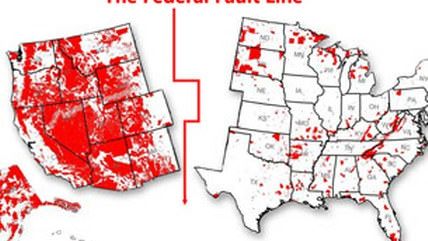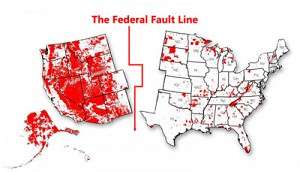Battle Over Western Lands is Far Bigger Than the Bundy Controversy


The recent face-off between the Bundy family and its supporters on the one hand, and the Bureau of Land Management and its enablers on the other, is hardly the first word in the tussle between westerners and the federal government over control of land. The battle has probably been inevitable since western settlers ceded control of the lion's share of the open spaces around them to distant Washington, D.C. in return for admission to the union. Now, those spaces aren't quite so open, and their inhabitants are more assertive—and see themselves (often with good reason) as better stewards of their turf than distant officials who seem to pride themselves on inefficiency and lousy accounting practices.
So, why the fuss? As the Congressional Research Service points out in a 2012 report, "more than 60% of the land in Alaska is federally owned. … Nearly half of the land in the 11 coterminous western states is federally owned. … In the rest of the country, the federal government owns 4% of the lands."
Nevada, home of the Bundy standoff, is 81 percent federal land. Even in the open West, that can be confining.
This massive absentee ownership, concentrated in half of the country, created conflicts from day one. Debates raged over use of that land, access to resources, taxes, and whether such vast areas should be held by government authorities in general, and distant officials in particular.
At the Christian Science Monitor, Brad Knickerbocker writes:
In Salt Lake City Friday, representatives from Utah, Idaho, New Mexico, Arizona, Nevada, Wyoming, Oregon, and Washington met for a "Legislative Summit on the Transfer of Public Lands."
"Those of us who live in the rural areas know how to take care of lands," Montana state Sen. Jennifer Fielder said at a news conference. "We have to start managing these lands. It's the right thing to do for our people, for our environment, for our economy and for our freedoms."
In other words, today's revival of the "Sagebrush Rebellion" is as much about political philosophy as it is about great stretches of the largely-arid territory west of the 100th meridian splitting the Dakotas and running down through Texas.
Without a doubt, Utah takes the lead in the effort by westerners to assert local control over land and its resources. Last year, state lawmakers passed the Transfer of Public Lands Act, essentially demanding that the federal government surrender the two-thirds of the state controlled by Washington, D.C. Utahns explicitly did so as part of a Financial Ready Utah (PDF) movement that says "the current fiscal trajectory of the federal government is unsustainable" and foresees a day when state residents will have to pay all of their own bills.
Utah State Rep. Ken Ivory (R-West Jordan) told Reason Foundation's Leonard Gilroy:
In the 2011 session—when we realized that over $5 billion of our state revenue comes from a federal government that's broke—that's when we started to flesh out how serious those numbers were. Something on the order of 40% of our state revenue comes from an unsustainable source in our federal governing partner. We looked at the magnitude of this risk and started to think about how we could broaden our revenue base and get to a point of economic self-reliance.
Controlling the land and resources is a big step in that direction.
The "Legislative Summit on the Transfer of Public Lands," gathering representatives from nine western states in Salt Lake City, was organized by Ivory and borrows its terminology from that Utah move, showing that concerns about reducing financial reliance on the feds and gaining local control are spreading. Planning for the conference predates the Bundy standoff and the gathering addresses broader issues—but it certainly got a nudge from headlines and tense video of federal agents facing off with locals over land use.
So, what started as a simmering problem over the control of land and resources has only been fueled by the growing prosperity and sophistication of westerners. They see little reason to leave their fate in the hands of a stumbling federal government that can't balance its books.
The Bundy controversy is almost a blast from the past, adding an old-timey veneer—maybe an obscuring one—to a conflict that remains very current and pressing for westerners.


Show Comments (145)